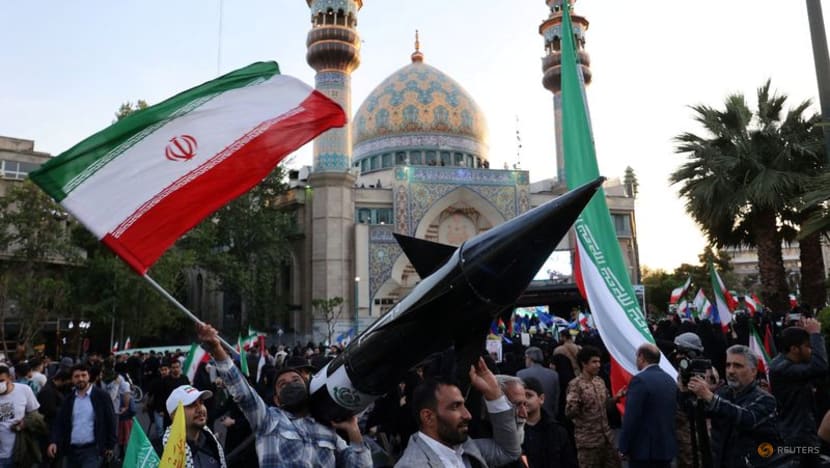Snap Insight: Israel may have had the ‘last word’ with reported attack on Iran, but Netanyahu is no clear winner
Anything that distracts from the war in Gaza and eases international pressure on Israel cannot be in Iran’s interest, says international security expert Stefan Wolff from the University of Birmingham.

FILE PHOTO: Iranians carry a model of a missile during a celebration following the IRGC attack on Israel, in Tehran, Iran, April 15, 2024. Majid Asgaripour/WANA (West Asia News Agency) via REUTERS/File Photo

This audio is generated by an AI tool.
BIRMINGHAM, England: Overnight on Friday (Apr 19), Israel responded to the massive, but ultimately low-impact, Iranian aerial attack last weekend with a reported strike of its own.
This, too, did little actual damage, but it sent a clear message to Iran: Israel has the capabilities not just to attack Iran but also to carry out potential precision strikes at its nuclear facilities like those in Isfahan, a central region that also hosts a missile factory and an airbase.
Moreover, and likely very important to Israeli Prime Minister Benjamin Netanyahu, it is likely to be the “last word” in the current escalation between the two foes. Tehran has downplayed the significance of the Israeli strike in its tightly controlled media landscape and an Iranian official told Reuters there were no plans to respond.
If this is indeed the end of it, for now at least, then it confirms two things.
NO INTEREST IN ESCALATION
First, Iran has no interest in further escalation.
This was already apparent in Iran’s strike on Israel, which was carried out in a way that provided ample early warning to Israel and its allies. This allowed them to effectively neuter the attack by taking down all but a few of the 300 projectiles launched.
Iran’s reasoning behind this is likely complex. The regime in Tehran want to avoid a direct confrontation with a regional rival that has superior military capabilities – including nuclear weapons – and is backed by some of the world’s most powerful militaries. But Iran’s own allies, Russia and China in particular, will also likely have communicated their disinterest in a full-scale escalation.
Anything that distracts from the war in Gaza and eases pressure on Israel on that front, including from its Western allies, cannot be in Iran’s interest either.
The growing isolation of Mr Netanyahu’s government is surely more advantageous to Tehran: It drives a welcome wedge between Israel and the West, and it limits the prospects of rapprochement between Israel and the Arab states. Saudi Arabia remains Iran’s other major regional rival despite last year’s China-brokered deal to normalise ties between Tehran and Riyadh.
PRIME MINISTER BENJAMIN NETANYAHU LEFT IN A WEAKER POSITION
Second, even though Mr Netanyahu may have had the last word in this latest major confrontation, he does not emerge as a clear winner.
On the contrary, of the many options that the Israeli government had in its arsenal of possible responses – from actually damaging strikes against multiple nuclear sites, military bases, critical national infrastructure to cyberattacks and assassinations – it chose the one with lowest risk of escalation.
This happened most likely because of US pressure, not out of a sense of restraint. It indicates that for all his bluster, Mr Netanyahu can still be effectively constrained and prevented from engulfing the entire Middle East into an all-out war.
It also means that a likely earlier calculation by the Israeli government that escalation on the “Iranian front” could take international pressure off its military campaign in Gaza has failed to materialise. This leaves Mr Netanyahu in a weaker position domestically and internationally.
FLIPSIDE OF ONE AVERTED CRISIS
Having in all probability avoided a very dangerous situation from escalating further, however, does not in and of itself pave the way towards more peace and stability in the Middle East.
For the flipside of one crisis managed effectively is that all sides can now refocus their resources: Israel on its war in Gaza and Iran on support for its many proxies in the region.
This does not bode well for the civilians suffering the brunt of violence across the Middle East, nor does it mean that all will remain quiet on the Iran-Israel front.
Stefan Wolff is Professor of International Security at the University of Birmingham and Head of the Department of Political Science and International Studies.

















